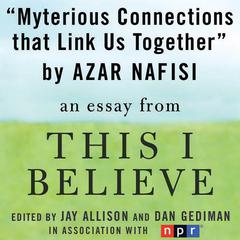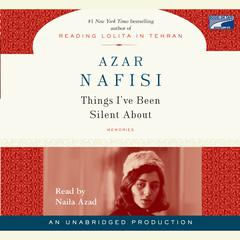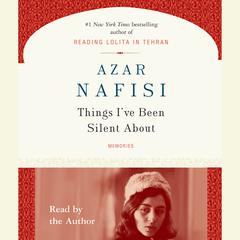 Play Audiobook Sample
Play Audiobook Sample
Reading Lolita in Tehran: A Memoir in Books Audiobook
 Play Audiobook Sample
Play Audiobook Sample
Quick Stats About this Audiobook
Total Audiobook Chapters:
Longest Chapter Length:
Shortest Chapter Length:
Average Chapter Length:
Audiobooks by this Author:
Publisher Description
Every Thursday morning for two years in the Islamic Republic of Iran, a bold and inspired teacher named Azar Nafisi secretly gathered seven of her most committed female students to read forbidden Western classics. As Islamic morality squads staged arbitrary raids in Tehran, fundamentalists seized hold of the universities, and a blind censor stifled artistic expression, the girls in Azar Nafisi’s living room risked removing their veils and immersed themselves in the worlds of Jane Austen, F. Scott Fitzgerald, Henry James, and Vladimir Nabokov. In this extraordinary memoir, their stories become intertwined with the ones they are reading. Reading Lolita in Tehran is a remarkable exploration of resilience in the face of tyranny and a celebration of the liberating power of literature.
Download and start listening now!
"I was talking to a retired English professor once and pulled this book out of my bag after she made reference to another professor who was beginning work on a project on art and democracy. The professor--herself a feminist and key figure in the early years of the university's Women's Studies interventions--responded with a quip about this book's solipsism. Many detractors have articulated similar sentiments. If you are looking for a historical, sociological and/or journalistic treatise on revolutionary and post-revolutionary Iran avoid this book. Nafisi's subtitle makes it claims from the get go. "A Memoir in Books." Nafisi is many things in this book but she is primarily an unabashed lover of literature--of reading--here. This is a book about the importance of art. About "...education as the practice of freedom" as bell hooks once called it. About trying to construct something like an ethical life/world in deeply compromised situations. Do yourself a favor and read this book."
— Jason (4 out of 5 stars)
Quotes
-
“Resonant and deeply affecting…an eloquent brief on the transformative powers of fiction.”
— New York Times -
“An intimate memoir of life under a repressive regime and a celebration of the vitality of literature…as rich and profound as the novels Nafisi teaches.”
— Miami Herald -
“A quietly magnificent book…[Nafisi’s] passion is irresistible.”
— LA Weekly -
“This book transcends categorization as memoir, literary criticism, or social history, though it is superb as all three…Nafisi has produced an original work on the relationship between life and literature.”
— Publishers Weekly
Awards
-
Oprah Pick for Best Memoirs of a Generation
Reading Lolita in Tehran Listener Reviews
- — Lorraine Strittmatter, 5/9/2021
-
" A good perspective on life in Iran before and after the fall of the Shah. It is time to read it again. "
— J, 2/17/2014 -
" Bravery in the face of great peril; an abundance of passion for literature; and a commitment to world literacy--as to both knowing the Workd and knowing how to read; make this author and her dedicated circle true literary heroines, in the fullest definition of the phrase. "
— Barbara, 2/15/2014 -
" Enjoyed the depths of character hidden under the chador, and the close personal contact mixed with the wider challenges for Iran. "
— Douglas, 2/12/2014 -
" Interesting subject, but book was very hard to read. Most didn't get through the book, and those who did didn't feel it was worth the effort. "
— Dd, 2/3/2014 -
" Maverick book club choice for November "
— Madmedea, 1/25/2014 -
" A good read. Nafisi's Professor of English literature profession is obvious in the writing style which makes for a rather wordy and occasionally meandering story. But the depiction of life in Tehran is vivid and the literature analysis adds to it. "
— Julie, 1/20/2014 -
" God I hate this book. I have been slogging through it for over a year, and I will eventually finish it, because I'm always that determined to finish books that I own. And once I do, I will tell you just exactly why I hate this book. "
— Colleen, 1/16/2014 -
" I love it I love it I LOVE IT. "
— Catherine, 12/2/2013 -
" I found the reading upsetting because I take my freedom for granted. My wish is to never have to experience the oppression that these women dealth with. "
— Kathy, 8/24/2013 -
" Sometimes a bit dense and hard to get through chapters, but interesting and overall pretty good read if you like fiction mixed with non-fiction/political ideas. "
— Kristen, 8/12/2013 -
" Excellent book! I got it as a Christmas gift and before reading it, I read all the books they read in the book! "
— Maura, 6/27/2013 -
" Just couldn't get into it. Found it boring. "
— Mary, 10/17/2012 -
" It was slow in process of reading. But in retrospect, I like it a lot. It's been a couple of years since reading this, but I still think through much of the content. "
— Caitlin, 1/21/2012 -
" Powerful. Period. A must read for everyone. Period. PERIOD. "
— Stephanie, 9/22/2011 -
" I thought I was going to experience something of life for women in Tehran. Instead I got a very academic book of literary criticism. "
— Suzanne, 9/3/2011 -
" A combination of literature, culture, and the scope of government wound up in the life of a woman on the fray of society. Perfect book! "
— Kelsey, 6/29/2011 -
" Interesting book. It was a good way to read about the authors, as well as understand the history of Tehran and Iran. I would recomment it "
— Diane, 6/26/2011 -
" I read this a long time ago and it was intriquing. Can't imagine living without the freedoms we tend to take for granted. "
— Gay, 6/22/2011 -
" interdisciplinary<br/>great for students of AP literature "
— Polly, 6/22/2011 -
" One of the many books I have read on women and Islam "
— Grandma, 6/21/2011 -
" A huge subject condensed into a novel which attempts to cover it extensively. The result is an enlightening but frustrating read. The book fails to cover the subject fully from either an historical or human perspective. "
— Deborah, 6/15/2011 -
" A book I should care about because of the social importance the activities in the book share. I just couldn't find a personal connection. "
— Marcus, 6/14/2011
About Azar Nafisi
Azar Nafisi is a professor at John Hopkins University. She has written for the New York Times, the Washington Post, and the Wall Street Journal among others.




























